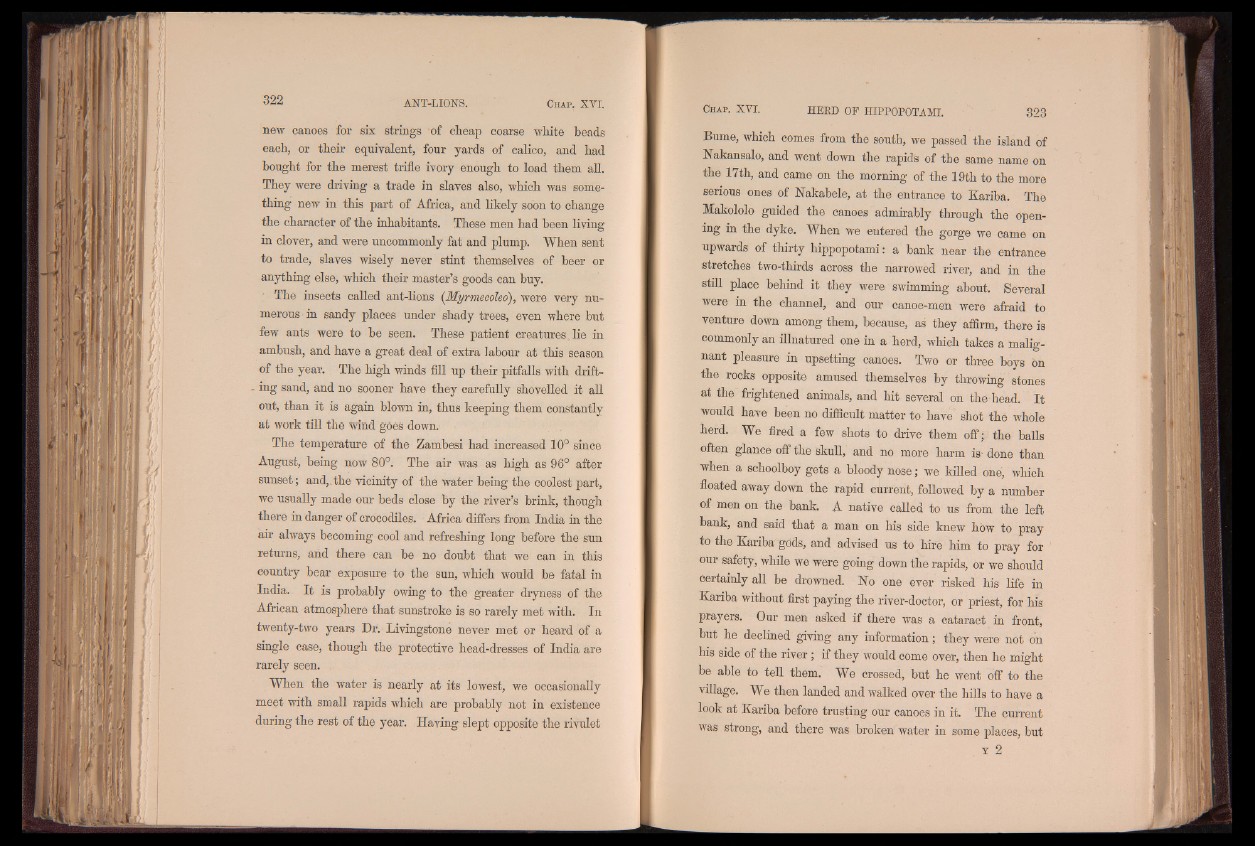
new canoes for six strings of cheap coarse white beads
each, or their equivalent, four yards of calico, and had
bought for the merest trifle ivory enough to load them all.
They were driving a trade in slaves also, which was something
new in this part of Africa, and likely soon to change
the character of the inhabitants. These men had been living
in clover, and were uncommonly fat and plump. When sent
to trade, slaves wisely never stint themselves of beer or
anything else, which their master’s goods can buy.
The insects called ant-lions (Myrmecoleo), were very numerous
in sandy places under shady trees, even where hut
few ants were to be seen. These patient creatures lie in
ambush, and have a great deal of extra labour at this season
of the year. The high winds fill up their pitfalls with drift-
- ing sand, and no sooner have they carefully shovelled it all
out, than it is again blown in, thus keeping them constantly
at work till the wind goes down.
The temperature of the Zambesi had increased 10° since
August, being now 80°. The air was as high as 96° after
sunset; and,.the vicinity of the water being the coolest part,
we usually made our beds close by the river’s brink, though
there in danger of crocodiles. Africa differs from India in the
air always becoming cool and refreshing long before the sun
returns, and there can be no doubt that we can in this
country bear exposure to the sun, which would be fatal in
India. It is probably owing to the greater dryness of the
Aftican atmosphere that sunstroke is so rarely met with. In
twenty-two years Dr. Livingstone never met or heard of a
single case, though the protective head-dresses of India are
rarely seen. .
When the water is nearly at its lowest, we occasionally
meet with small rapids which are probably not in existence
during the rest of the year. Having- slept opposite the rivulet
Bume, which comes from the south, we passed the island of
Nakansalo, and went down the rapids of the same name on
the 17th, and came on the morning of the 19th to the more
serious ones of Nakabele, at the entrance to Kariba. The
Makololo guided the canoes admirably through the opening
in the dyke. When we entered the gorge we came on
upwards of thirty hippopotami : a bank near the entrance
stretches two-thirds across the narrowed river, and in the
still place behind it they were swimming about. Several
were in the channel, and our canoe-men were afraid to
venture down among them, because, as they affirm, there is
commonly an illnatured one in a herd, which takes a malignant
pleasure in upsetting canoes. Two or three boys on
the rocks opposite amused themselves by throwing stones
at the frightened animals, and hit several on the head. I t
would have been no difficult matter to have" shot the whole
herd. We fired a few shots to drive them off; the bafts
often glance off the skull, and no more harm is- done than
when a schoolboy gets a bloody nose ; we killed one, which
floated away down the rapid current, followed by a number
of men on the bank. A native called to us from the left
bank, and said that a man on his side knew how to pray
to the Kariba gods, and advised us to hire him to pray for
our safety, while we were going down the rapids, or we should
certainly ail be drowned. No one ever risked his life in
Kariba without first paying the river-doctor, or priest, for his
prayers. Our men asked if there was a cataract in front,
but he declined giving any information ; they were not on
his side of the river ; if they would come over, then he might
be able to tell them. We crossed, but he went off to the
village. We then landed and walked over the hills to have a
look at Kariba before trusting our canoes in it. The current
was strong, and there was broken water in some places, but
v 2